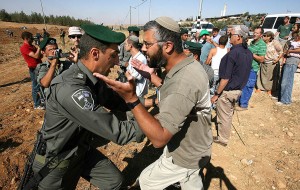Special to WorldTribune.com
TEL AVIV — The government of Israeli Prime Minister Benjamin
Netanyahu, despite warnings by the intelligence community, has been stunned
by the ferocity of Jewish resistance to demolition operations in the West
Bank.
Officials said Netanyahu and Defense Minister Ehud Barak were taken by
surprise by the violent opposition to the demolition of Jewish homes and
communities in the West Bank, with more than 400,000 Jewish residents. They
said the number of Jews prepared to fight Israeli soldiers and police as
well as stage provocations exceeded operational assessments.

“The situation is intolerable,” Netanyahu said during an emergency meeting.
On Dec. 13, the prime minister convened senior defense officials after unprecedented activities by Jews to stop government-ordered demolitions of communities throughout the West Bank. In one operation, scores of Jews infiltrated and vandalized a military base in which special operations police were being prepared to destroy up to 10 outposts.
“Overnight, about 50 right-wing activists infiltrated the Ephraim
regional division headquarters, set fire to tires and damaged vehicles with stones, bottles and by placing nails on the road,” the military said. “In addition, rocks were thrown at the Ephraim regional division commander’s vehicle. The commander was not injured.”
In the second incident, about 30 young Jews entered a closed military
zone along the Jordanian border and tried to establish an outpost. Officials
said the infiltration nearly resulted in a diplomatic confrontation with
Jordan.
The opposition activities came amid reports that the Israel Army was
preparing to imminently destroy residential outposts throughout the West
Bank, particularly Ramat Gilad, established a decade ago. Within hours,
hundreds of young Jews rushed to the outposts while others attacked Army
vehicles and Palestinian motorists.
“They endangered lives and their actions threaten to damage the delicate
relations Israel has with its neighbors,” Barak, who called the Jews
“terrorists,” said in a statement.
In the end, no military operations against the outposts were reported.
But on late Dec. 13, the military organized a convoy of bulldozers and
command cars through the West Bank that again triggered stone-throwing
attacks by Jews on Palestinian motorists.
“Unfortunately, Ehud Barak acted like a pyromaniac and intentionally set
the ground on fire by trying to destroy homes in Ramat Gilad despite the
advanced talks aimed at solving the issue peacefully,” Samaria Regional
Council chief Gershon Mesika said.
Officials said the intelligence community, particularly the Israel
Security Agency, had warned of rising Jewish resistance to demolition
operations. They said the resistance was attracting thousands of young Jews,
with quiet support given by rabbis, educators, politicians and even some
army field commanders.
“Israeli military intelligence does not collect information on residents
of Judea and Samaria [West Bank],” Barak said in a radio interview on Dec.
14. “The Army’s position is that Israelis are not an intelligence target.”
Officials said Barak has ordered the military to prepare for the
destruction of nearly 30 Jewish outposts, which contain more than 1,000
people. They said the preparations included exercises, intelligence
gathering as well as mobilization of forces that could overcome violent
resistance. ISA was said to have assessed that about 1,000 Jews could be
mobilized within hours to help defend any of the threatened outposts.
“I never saw such hatred directed by Jews toward soldiers,” Central
Command chief Maj. Gen. Avi Mizrahi said of the attack on the Ephraim base.
“I saw them with my own eyes throwing rocks and attacking soldiers.”
The Jewish attack on the army base was criticized by members of
parliament as well as prominent Israeli residents of the West Bank. But
officials said the Jewish resistance movement was fueled by rabbis and
activists unconnected to the military or government.
“We are not talking about individuals or small groups,” an official
assigned to monitor the West Bank said. “This is a rapidly growing segment
of a highly-devout religious Jewish community that sees government policy as
well as those who implement it as evil.”
One scenario raised within the military was that soldiers and vehicles
could be forced to avoid Jewish areas out of concern of vandalism or even
attack. A prominent Jewish opposition figure warned soldiers that their
jeeps and armored combat vehicles could be targeted anywhere in the West
Bank.
“Every [Army] vehicle has a switch essential for its operation,” Boaz
Albert, a resident of the Jewish community of Yitzhar, wrote. “It is very
important that toothpicks or wooden chips do not get stuck in the switch,
and glue must not be poured in it.”

You must be logged in to post a comment Login